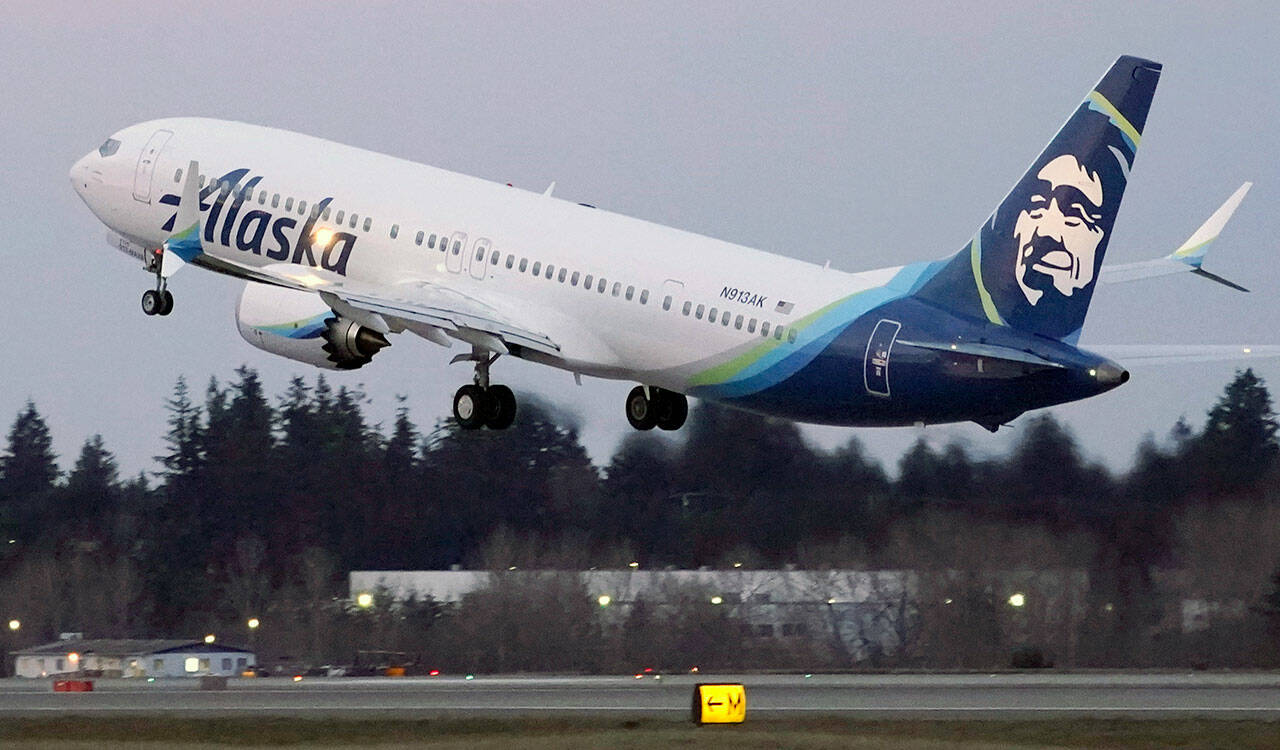EVERETT — In the next two months, Alaska Airlines will begin flying bigger jets on two of its 12 routes out of Paine Field.
Beginning Feb. 17, Alaska will add Boeing 737 aircraft to serve Phoenix, followed by 737 service to Las Vegas that starts March 18.
Alaska’s 737 Max can seat 178 passengers, more than doubling passenger capacity on those two flights.
Since launching commercial passenger service from a two-gate Paine Field terminal in March 2019, the Seattle-based carrier has only operated Embraer E175 jets, which seat 76 passengers, at the Snohomish County-owned airport.
“We recently loaded 737 aircraft service into our schedule for the first time for our flights at Paine Field. That service will be for new, second daily flights in the afternoon to Phoenix and Las Vegas,” said Ray Lane, Alaska spokesman. “As with other markets during the pandemic, we’re seeing stronger demand for leisure destinations such as Phoenix and Las Vegas. These are two of the most popular routes from Everett.”
“Upgauging to 737 aircraft allows us to better meet the demand we’re seeing for sunny destinations, especially during winter months,” Lane said.
Neither the Federal Aviation Administration nor the airport owner can dictate what type of aircraft a commercial airline employs at an airfield. As long as the aircraft can safely operate at the facility, airplane choice is up to the commercial carrier. Public use airports such as Paine Field cannot deny access to an aircraft operator if they can safely operate at the facility, according to FAA regulations.
As promised, Alaska beefed up the Paine Field schedule this month after the coronavirus stalled a plan to boost the number of flights in the fall.
The airline currently serves nine destinations with 12 daily departures from the Paine Field terminal, which was built and is operated by privately owned Propeller Airports.
Alaska is the only airline that now operates at the terminal since United Airlines discontinued Everett service in October.
Alaska does not currently have plans to add a Denver flight, Lane said.
“We’re very excited that our schedule is starting to come back,” said Brett Smith, CEO of Propeller Airports. “People will be able to get to more places from Paine Field.”
More 737s could be added to Alaska’s Everett schedule, Lane said.
“If market conditions are right, we could upgauge to additional 737 service on other routes from Paine Field in the future,” Lane said. “Paine Field continues to be an important market for us.”
Alaska currently offers 12 daily departures — to Boise, Las Vegas, Orange County, Palm Springs, Phoenix, Portland, San Diego, Spokane and Tucson. Three cities — Boise, Portland and Spokane — have twice-daily service.
When the passenger terminal opened in 2019, United Airlines offered six daily flights and Alaska offered 18 daily departures.
In the first year of the terminal’s operation, more than a million passengers were served and, including United’s timetable, there were 24 daily roundtrip flights on the schedule.
Airline travel, which was crushed by the COVID-19 pandemic, began to recover last year, but the appearance of the delta variant slowed the pace last summer and fall.
Now, the omicron variant is decreasing passenger traffic on some routes and causing air and ground crew shortages at airlines due to the large number of sick or quarantined workers.
Alaska Airlines announced this month that it would reduce overall departures by about 10% through the end of January because of those shortages.
In a company statement, Alaska Airlines said omicron’s disruptive effects and the “unprecedented number of employee sick calls have impacted our ability to operate our airline reliably.”
“We’re at our best when we are safe, reliable and caring,” the company said. “And right now, we need to build more reliability back into our operation as we deal with the impacts of omicron and during a time when guests generally fly less.”
Despite setbacks, air travel continues to rebound.
On Tuesday, 1.7 million people passed through Transportation Security Administration checkpoints across the U.S., compared to about 900,000 travelers on the same day last year and some 2.3 million in 2019.
Janice Podsada: jpodsada@heraldnet.com;
Talk to us
> Give us your news tips.
> Send us a letter to the editor.
> More Herald contact information.
























